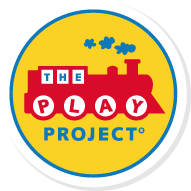According to a new clinical report from the American Academy of Pediatrics (AAP), play is so important to a child’s development that pediatricians should write prescriptions for play before the age of two (The Power of Play). Parent implemented models for autism early intervention, such as The PLAY Project, offer an affordable, immediate early intervention solution to engage children with autism in play. Children with autism require more help than typical children in regards to playing naturally, which is why implementing the PLAY Project is so important.
The authors of the report state that essentially every life skill can be built up with play, both at home and in school. Few things beat the power of play, the authors say. Play helps children build skills that promote executive function, enhances their ability to learn, and strengthens their resistance to stress (The Power of Play). In relation to The PLAY Project, our proven research shows that: PLAY Project parents consistently learned the model and their children made gains in social interaction and decreased their autism severity much more than children who didn’t get The PLAY Project’s intervention.
“I think we’re continuously learning that play is really essential for kids — it’s not just an afterthought or an accessory,” Dr. Kathy Hirsh-Pasek, a professor in the psychology department at Temple University and one of the report’s lead authors told AAP News. Collaboration, negotiation, conflict resolution, self-advocacy, decision-making, a sense of agency, creativity, leadership, and increased physical activity are just some of the skills and benefits children gain through play,” the report’s authors explain. The PLAY Project allows children with autism to gain the benefits that play offers.
“Play with parents and peers is fundamentally important for developing social, emotional, language and cognitive skills. The benefits of play cannot really be overstated in terms of mitigating stress, improving academic skills and helping to build the safe, stable and nurturing relationships” (The Power of Play). Here at The PLAY Project, we believe that play is essential. The PLAY Project emphasizes the importance of parent-empowerment as well. PLAY Consultants teach families the 7 Circles of The PLAY Project: teaching PLAY Project principles, methods, techniques & activities, modeling how to PLAY, coaching parents as they PLAY, taking video samples of consultant and parent PLAY, giving a monthly practical written feedback plan for parents, and encouraging families to PLAY throughout the day.
To read The Power of Play: A Pediatric Role in Enhancing Development of Young Children, click here.
Simply glimpse into the onslaught of articles, including NPR’s 5 Proven Benefits Of Play, and Want Creative, Curious, Healthier Children with 21st Century Skills? Let Them Play released since the APA report. The titles alone give a snapshot of potential for our children’s growth and development through the power of play, and we could not agree more!
The Power of Play: A Pediatric Role in Enhancing Development in Young Children. Michael Yogman, Andrew Garner, Jeffrey Hutchinson, Kathy Hirsh-Pasek, Roberta Michnick Golinkoff. COMMITTEE ON PSYCHOSOCIAL ASPECTS OF CHILD AND FAMILY HEALTH, COUNCIL ON COMMUNICATIONS AND MEDIA. Pediatrics Aug 2018, e20182058; DOI: 10.1542/peds.2018-2058

